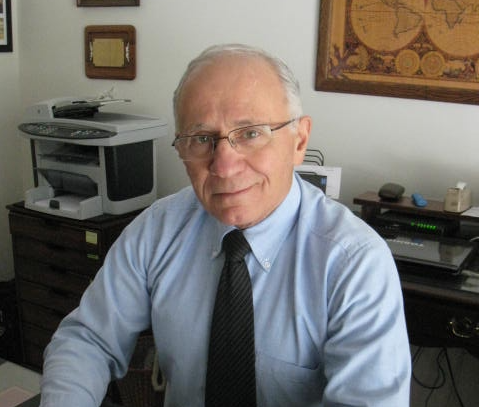| “For every house is built by someone, but He who builds all things is God. But Christ as a Son over His own house, whose house we are if we hold fast the confidence and the rejoicing of the hope firm to the end.” (Heb. 3:4, 6)This passage speaks of three elements: a house being built, of faith, and of time. A fourth element may be added if one considers the exercise of faith involves the matter of the mind to even consider these things. May “simple faith” never be minimized. This faith is initially upon the unchangeable truth of the Gospel of Christ, and over time to standing upon that truth like a house built upon a solid foundation—“For no other foundation can anyone lay than that which is laid, which is Jesus Christ.” (1 Cor. 2:11) This fundamental faith is most commendable and necessary.What is also brought into focus here is the nature of the house itself. What is its architectural blueprint? Who is the architect? By my very nature I am a “jack of all trades but master of none.” I am not a builder by profession, but I can literally build a “habitable” house from start to finish. However, I would much rather live in a house built by a master craftsman. The differences lie not only in its outward appearance as something of quality and precision, but also of its inward strength and integrity. In like manner, we must all come to the realization of this need for our Lord, the Master Craftsman, to be the One to build this spiritual house in which we are to live. Though the strength and talents of man may be many, and able to produce some things seemingly good and godly, they are yet ineffective to build God’s house. (Heb. 3:6)Contained in the following pages is a challenge to build upon this sure foundation with new understanding—so that this building may not be of wood, hay and stubble, something of man, something that will eventually perish. Rather this is to be a spiritual house which has a foundation and “whose builder and maker is God.” (Heb. 11:10) Indeed this will be a challenge. We will be considering things perhaps not considered before, and from a new perspective. We must look a little deeper into the Word and the Spirit and understand the necessity for the “renewing of the mind.” (Rm. 12:2) |
Relationship between Time and Faith
The original intent of this article was to write about the Trilogy of Time and how it fits into God’s Master Plan for His creation, and man in particular. However, while considering time and its elements of past, present, and future tenses, I soon realized I could not address time, in both the natural and especially the spiritual, without considering its intimate connection and relation to the Trilogy of Faith. Even though faith is always acted upon at the present time, the direction or object of our faith may be directed towards a past, present, or even future spiritual event. For the life of the believer time and faith are interwoven and must be considered together to fully appreciate and apprehend spiritual realities.
Consider, for example, the profound but familiar declaration of Paul, “I have been crucified with Christ, it is no longer I who live, but Christ who lives in me; and the life I now live in the flesh I live by faith in the Son of God, who loved me and gave Himself for me.” (Gal. 2:20) This single verse of scripture is most powerful for understanding spiritual growth and development. The role of faith is evident in believing in an unseen reality, i.e., co-crucifixion with Christ and His indwelling life. This faith is not only in the crucifixion and death of Christ, but also of the believer’s past presence of being ‘in Christ,’ spiritually, at that time. The element of time in this scripture involves a past, being crucified with Christ. In addition, it also involves a present reality of Christ who lives in me. So you see time and faith must be considered together to fully understand and apprehend into our lives this spiritual reality. In order to walk in the reality of a spiritual truth we must first understand it.
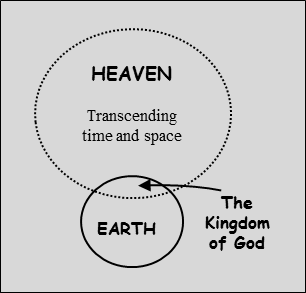
Is it also understandable that the consideration of time and faith must be accompanied by a new way of thinking—a way of thinking that involves the spirit? This takes the believer beyond the realm of the natural and how one has experienced life thus far. By its very definition, faith requires belief in things that exist but have not yet been seen, heard, or touched upon. (Heb. 11:1) However, “Blessed are they that have not seen, and yet believed.” (Jn. 20:29) This faith also demands the transcending of time, for the realm of the spirit is not confined by time or by space. It must be remembered, as it was written in more detail previously in this series, that entrance into the Kingdom of God by the new birth is entering a realm that intersects the spiritual domain of heaven with the natural domain of this earth. All the new believer has known up until now is life on planet earth through his body: what he sees, touches, hears, smells, and tastes. His thoughts, intellect, and emotions are thus developed
The believer must begin to adjust his thinking to a whole new dimension now opened before him—his strength, his talents and wisdom operating in this physical realm of time and space are now insufficient. The believer now perceives things through the realm of the spirit…by faith! This calls for a “renewing of the mind.”
| In the pages ahead. In this chapter a brief look will be made into the necessity for the renewing of the mind for the laying hold of these truths. Then, in order to lay a foundation, we will consider the trilogy of time alone, then that of faith. In the following chapter, a consideration will be made of how time and faith are interwoven with one another to give life and meaning to our Christian experience. |
Becoming Spiritually Minded
We must preface our discussion on the trilogies of time and faith with some thoughts on the necessity for proceeding with a new, or different, way of thinking. Because time and faith involves both the natural and spiritual realms, each are perceived differently. One may either rely on his physical and emotional senses in relating to his natural environment or by faith, as in the evidence of things not seen, he relates to his spiritual environment. Thus:
“And do not be conformed to this world, but be transformed by the renewing of your mind, that you may prove what is that good and acceptable and perfect will of God.” (Rm. 12:2)
God has so perfectly designed the mind of man to fit the trilogy of time. He has a memory to retain and recall past events. The recall of our past affects our current actions and experiences. Memory is a key aspect of man’s personal identity and character. It is suffused with emotions such as love and grief. It remembers covenants, oaths, and promises. It is essential for reasoning and decision making. Man’s memory shapes much of his moral life. Repeatedly in scriptures man is called upon to remember these things (covenants, feast days, commandments, etc.), to think upon them, and to do things in memory of certain times, people, or events. Thus, the memory links our past, both of the natural and the spiritual, to our present life.
The imagination of the mind looks into the future. In the natural one speculates on what the future may bring. Goals are established and ambitions are given direction. Sometimes the goals are realistic while other times they may be just fantasies. Spiritually, there is a future reality for the believer. There is no need for speculation, only for a proper understanding of God’s eternal purposes for His creation and the provisions He has made for us to press towards that eternal call. Vision is a good word that is often used to describe this mental picture in man’s imagination for his journey while on this earth and the eternal destiny yet to come. It is written, “Where there is no vision, the people perish.” (Prov. 29:18) Here perish means unrestrained. The people are without direction, like one lost in the woods. Proper vision fixes the gaze of the believer, his sights are set on the goal, e.g., God’s high calling.

Memory of the past and imagination for the future affects our perception of our daily actions and experiences and shapes much of our personal identities. They affect our moods as they invoke emotions of love, grief, longing, and regret—and, may ignite a passion. “And it came to pass” is an interesting biblical expression. It shows the importance of the future and the past in man living, experiencing, making decisions in what we call the present—which is really that split-second after the coming and before the passing. Man’s life is actually lived in that threshold between the future and his imaginations and the memories of his past. It is the intent of this writing to explore, and bring to attention, this time factor outside the natural realm
How does all of this fit into our spiritual life and spiritual maturity? We all have a natural or secular history and imagination for the future. Our realistic look into the future is shaped by the “truths” of our memories. Today, standing at the threshold between the future and the past, we make decisions. Spiritual histories and imaginations guide our present day decision-making and relationships. Spiritual history is not a natural history. It does not enter the soul of man through natural experiences. One’s spiritual history may invoke certain emotions but are not caused by feelings like affections, remorse and fear, or obedience to religious practices or laws of morality. Spiritual history actually begins in the realm of the spirit, and it is by…faith! Only when it is conceived in the spirit is there any impartation into the soul. You see, the soul develops its character not only by worldly or outward experiences through the body, but also by faith through the spirit in heavenly realities that involve his very life. These realities are ever before us, waiting to be activated in our lives by faith.
The Trilogy of Time
The Past. On the first day of the Hebrew month, Tishrei, Israel celebrates Rosh Hashanah (literally “head of the year”). The Biblical name for this holiday is Yom Teruah (literally “day of shouting/blasting,” sometimes translated as the Feast of Trumpets). This is the anniversary of the creation of Adam and Eve and the beginning of their civil year. It is a part of the past, their natural history. However, there was a divine intervention in the history of Israel, the day God delivered them from the bondage of Egypt and set them on a course to a new life in a promised land. That day was called the Passover. The Passover meal was their last meal in Egypt when they ate the Passover lamb. It was also the threshold to a new life. The following morning began the vast exodus out of Egypt towards the land of promise. This represented a new beginning for Israel. (See Ex. 12) The Lord spoke to Moses and Aaron saying, “This month shall be your beginning of months; it shall be the first month of the year to you.” (vs. 2) Now, the month Nisan, at its new moon, began the “sacred year” for Israel
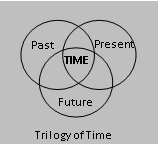
The two “beginnings” are vastly different—one of creation and one of Divine encounter and intervention. The Passover was to be a sacred feast day kept annually. The celebration was to be both a sign and memorial of the Lord’s deliverance from Egypt as a reminder to Israel and to their children. Thus, the children of Israel have a share in the history of Israel—its beginnings, its culture, its religion—all that is of Israel is now theirs.
As Israel has had two beginnings, so do believers in Christ. All men are born of the flesh, of their natural parents. They celebrate yearly birthdays on the same date. Their years are counted from that date. But thank God for His divine intervention, through Christ, into our lives. Now believers are of those “who received Him, to them He gave the right to become children of God, to those who believe in His name: who were born not of blood, nor of the will of the flesh, nor of the will of man, but of God.” (Jn. 1:13) There is a new beginning, a being “born again” of the Spirit. (Jn. 3:3-8) Thus a clear distinction must be made between our natural history and our spiritual “sacred” history. They cannot be treated or counted the same. One birth issued us into this world to become a part of this world, but in the second birth, “He has delivered us from the powers of darkness and translated us into the kingdom of the Son of His love.” (Col. 1:13)
| Man’s natural history actually predates his own birth and is intimately related to his ancestral history through his parents. He inherits his race, cultural heritage, physical appearance, as well as many aspects of his personality and character. In fact, Adam is a significant part of man’s natural history, for all mankind is of his seed. Man now bears the consequences of not only the biological essence of that seed but also of Adam’s own history with God.Of utmost is the realization that as man’s natural birth issued him into a framework of time: past, present, and future, his new birth has brought him into a vastly different dimension of time, in which one may actually share… by faith… time: past, present, and future, of Another, even Christ! One may reflect on his natural history, present situation, and future plans, but in the spirit, and in Christ, is a realm of time that operates in a vastly different dimension that actually requires a renewing of the mind, or way of thinking. |
| All mankind was “in Adam,” as in his seed. Thus mankind not only bares the physical nature of Adam, but he also has inherited the blessings and curses on Adam resulting from his actions of sin, as well as the promises God made to Adam. So now believers are “in Christ” and have a share in His nature and of the promises made to Him by God.“For as in Adam all die, even so in Christ all shall be made alive.” (1 Cor. 15:22)“And so it is written, ‘The first man, Adam, became a living being.’ The last Adam became a life-giving spirit. However, the spiritual was not first but the natural, and afterward the spiritual. The first man was of the earth, made of dust; the second man is the Lord from heaven. As was the man of dust, so also are those made of dust; and as the heavenly man, so also are those who are heavenly. And as we have born the image of the man of dust, we shall also bear the image of the heavenly man.” (1 Cor. 15:45-49)So, the believer now has two histories to remember, two presents to perceive, and two futures to imagine. The first, by natural birth, being in Adam, and another of being in Christ by spiritual birth. |
The Present. The tabernacle, the earthly “house of God,” was at the center of Israel’s daily life. All their life’s activities, whether religious or secular, were with the thought of God’s presence and providence. His presence was a constant reminder for them to be true to their calling and destiny. Their daily lives were to be centered around prayers, scripture readings, feast days, temple rituals, worship, particular dress, and written codes of behavior and moral conduct before God and man. Their history became a part of their present. This was to be true behavior whether bringing forth a sacrifice, training their children, conducting business affairs, or dealing with their enemies. “Now therefore, if you will indeed obey My voice and keep My covenant, then you shall be a special treasure to Me above all people; for all the earth is Mine.” (Ex. 19:5)
Their history was to permeate all aspects of their daily lives whether religious or secular—which includes all those worldly attitudes and activities. They could not be double-minded, i.e., religious on the Sabbath and secular another day. Their lives were to be “distinctly different”—set apart, holy.
This concept has not changed with the coming of the New Covenant in Christ. It has, however, elevated it to levels never before anticipated by man. The temple of God is no longer a building but is now individual believers and corporately, the Church. “Do you not know that your body is the temple of the Holy Spirit who is in you, whom you have from God, and you are not your own?” (1 Cor. 6:19) And, “In whom the whole building (the Church), being joined together, grows into a holy temple in the Lord, in whom you also are being built together for a habitation of God in the Spirit.” (Eph. 2:21, 22) Thus, the awareness of the centrality of God in our lives is raised to the nth degree. Believers’ lives are now no longer governed by an external set of rituals and laws, but of a Life from within, an abiding presence.
“Today, if you will hear His voice, do not harden your hearts.” (Heb. 4:7) Today! The word walk is used in many scriptures which means to conduct one’s life in such a manner. For example, “that you may have a walk worthy of the Lord, fully pleasing Him, being fruitful in every good work and increasing in the knowledge of God.” (Col. 1:10) Upon reading such scriptures one may try to begin a new way of conduct. Usually this is in the form of increased Bible reading, attending more services, and trying to get a handle on things like temper and self-control, and watching your tongue. These are things in our lives with which we are trying to deal. However, the way to deal with them is incorrect. Two scriptures will show light upon this type of walk: “For we walk by faith not by sight,” (2 Cor. 5:7) and, “Walk in the Spirit and you will not fulfill the lust of the flesh.” (Gal. 5:16)The way of the believer’s walk is determined by faith and Spirit and not by futile attempts of self-determination and vows. This will, hopefully, become more evident in the pages ahead.
The Future. Man is quite good at that third element of the mind, imagination. He is constantly speculating on his future. Sometimes science is invoked in predicting the stock market, weather, and climate patterns, earthquakes, or even human behavior as in “profiling.” Some speculations are based on horoscopes, astrology, fortune telling, and the like. Man is always looking for trends that may be extended into the future. Sometimes the past is a key to the future as the same processes that operated in the past continue to operate though at varying degrees of intensity. And, there is always what is called the “kicker.” This is an unexpected and often unpleasant discovery or turn of events. It is some disadvantage that is concealed or unnoticed. When the “kicker” pops up, everything changes. All that planning, those speculations, calculations, and schemes are nullified and one must anticipate a new future based upon changed conditions in his or her life. The future, in the natural, can at best be estimated and wished for. It is subject to wide swings of variation.
“Their eyes bulge from fatness; the imaginations of their heart run riot.” *(Ps. 73:7)
“For even though they knew God, they did not honor Him as God or give thanks, but they became futile in their speculations, and their foolish heart was darkened.” *(Rm. 1:21) *Lexicon translations
Thankfully, God is the Unchangeable One. Of Himself He declares, “For I am the LORD, I change not.” (Mal. 3:6) The future He has prepared for His children is not subject to variation but is solid in His promises: “Let us hold fast the confession of our hope without wavering, for He who promises is faithful.” (Heb. 10:23) One may expect, fully anticipate, the fulfilling of all the promises made to the believer in Christ Jesus. They are 100% predictable and reliable. “In whom (Christ) having believed, were *sealed with the Holy Spirit of promise, who is the guarantee of our inheritance until the redemption of the purchased possessions, to the praise of His glory.” (Eph. 1:13-14) *(“to seal” signifies ownership and the full security carried by the backing [full authority] of the owner.) To meditate on this thought alone must bring a sense of stability and security and peace.
If, in the natural, I received an absolute guarantee that my investments would bring a 100-fold return, I would be like the man who found a treasure hidden in a field. I would sell all that I have and purchase that investment. I would be a fool not to invest my all. And to think “…we have this treasure in earthen vessels, that the excellence of the power may be of God and not of us.” (2 Cor. 4:7) Now I realize that the last few paragraphs are particularly seasoned with a number of scriptural references. This is because these scriptures flowed effortlessly with the thought being presented of the believer’s future…as is the following scripture to close this section:
“Therefore we do not lose heart. Even though our outward man is perishing (decaying), yet our inward man is being renewed day by day. For our light affliction, which is but for a moment, is working for us a far more exceeding and eternal weight of glory, while we look not at the things which are seen, but at the things which are not seen. For the things which are seen are temporary, but the things which are not seen are eternal.” (2 Cor. 4:16-18)
Just What Is Faith?
As the physical senses are to man’s soul, linking him to this natural world about him, faith is to the spirit linking him directly to the surrounding invisible and intangible spiritual realm. One may hold a loved one’s hand and sense the physical warmth of that hand, but also most importantly, sense warmth in the heart, an affectionate emotional response. However, to draw close to God is not of the physical dimension, though many may feel that it is. Having addressed this point before, I will not belabor it here, but this is what Jesus inferred to the Samaritan woman He met at the well. (See John 4) He said that man must worship God in the spirit and not at physical places such as on a mountain or in a city like Jerusalem. I believe we may legitimately extend this thought to special buildings (churches, synagogues) with religious furnishings as well. It is not the location, church building, stained-glass windows, special garbs, organ music, candles, or the aroma of burning incense that draws us close in intimacy to our God. These things may well elicit an emotional response but not necessarily be of spirit and truth. The experience may ping our physical senses and stimulate certain emotional feelings, but be only of the natural and not spiritual.
Faith is “The substance of things hoped for, the evidence of things not seen.” (Heb. 11:1) There are two “senses” of faith. The first is the Word of God, written in the scriptures and spoken of by men of God. As it is written, “All scripture is given by inspiration of God, and is profitable for doctrine, for reproof, for correction, for instruction in righteousness, that the man of God may be complete, thoroughly equipped for every good work.” (2 Tim. 3:16-17) Paul commended those of the Thessalonian church, “When you received the word of God which you heard from us, you welcomed it not as the word of men, but as it is in truth, the word of God, which also effectively works in you who believe.” (1 Thes. 2:13) The believer must have confidence in the scriptures and not be shaken by naysayers, academicians, liberal theologians, and babblers that have no idea or understanding of its reality and truth.
The second sense of faith is the Holy Spirit. Scriptures are too numerous to list of the Holy Spirit: testifying of Christ, guiding into all truths, illuminating and revealing, bearing witness, and giving discernment. And very importantly, the Spirit has been sent to abide in you forever. It is imperative to note, however, though each believer is singularly a temple of the Holy Spirit, in most scriptural references the “you” mentioned is ‘second person plural.’ His presence in an individual does not make the individual infallible. The individual’s security in the Holy Spirit is corporately in the Body of Christ.
This principle is highlighted in 1 John 2:18-28. (It might be good if you paused a moment to read this portion of scripture.) There must be a guard against false teachers and antichrists. Their messages subtly permeate the church like an insidious cancer. These false teachers and their messages cannot be tolerated but must be discerned and purged from the church to keep believers from soul-damaging error. Thus, this is the role of the Holy Spirit. “But you (all) have an anointing from the Holy One, and you (all) know all things.” (vs. 20) And, “But the anointing which you (all) have received from Him abides in you (all) and you do not need anyone teach you (all), but as the same anointing teaches you (all) concerning all things, and is true, and is not a lie, and just as it taught you, you (all) abide in Him.” (vs. 27) Thus, it is the corporate Church, with the God-given and Spirit-anointed elders with ministries, such as apostles, prophets, teachers, pastors, and evangelists, who stand in guard of the Body of Christ. Under such, the Spirit of truth will prevail.
| The Root of Christian Faith. As you read this, faith remains the evidence of things not seen. However, its root lies in evidence that was seen, and heard, and touched—of first Jesus Christ in flesh and blood, and then again in His resurrected body of flesh and bone (See Lk. 24:39). The apostle John wrote,“That which was from the beginning, which we have heard, which we have seen, with our eyes, which we have looked, and our hands have handled, concerning the Word of Life, the life was manifested and we have seen, and bear witness, and declare to you that eternal life that was with the Father and was manifested to us—that which we have seen and heard we declare to you, that you also may have fellowship with us; and truly our fellowship is with the Father and with His Son Jesus Christ.” (1 Jn. 1:1-3)The apostle Paul recounts that after the Lord’s resurrection from the dead, Christ:“was seen by Cephas (Peter,) then by the twelve,After that He was seen by over five hundred brethren at once…After that He was seen by James, then by all the apostles…Then last of all He was seen by me also.” (1 Cor. 15:5-8)Now regarding the twelve mentioned above, you recall that after His resurrection Christ appeared a second time to the apostles, and said specifically to Thomas who had doubted His resurrection,“Reach your finger here, and look at my hands; and reach your hand here and put it into My side. Do not be unbelieving, but believing.” (Jn. 20:27)Then Jesus said to him, “Thomas, because you have seen Me, you have believed. Blessed are those who have not seen and yet have believed.” (Jn. 20:29)So you see the very root of faith is the visible and tangible evidence in the appearance of Jesus Christ in the flesh, and in His resurrected body. However, faith now rests upon the unshakeable certainty of the first-hand witnesses of that evidence.Paul later declared, “Even though we have known Christ according to the flesh, yet we know Him thus no longer.” (2 Cor. 5:16) He is now the resurrected and ascended Christ who sits at the right hand of the Father in heaven and has sent the Holy Spirit in His place.And Peter, in addressing the dispersed Christians, wrote, “whom having not seen you love. Though now you do not see Him, yet believing, you rejoice with joy inexpressible and full of glory, receiving the end of your faith—the salvation of your souls.” (1 Pet. 8-9)Thus the root of our faith is in the firsthand eye-witness and testimony of the apostles as evidence seen, heard, and touched. This is truth. And now, it remains the evidence of things not seen. |
The Trilogy of Faith and Its Relation to Time
We have thus far laid a foundation for both a further understanding of the trilogy of time and of a firm foundation of faith. We must now build upon that foundation an understanding of the all-important link of the trilogy of faith and to how faith and time, for the believer in Christ, are intimately interwoven with one another. Scripturally, the components of faith are to reckon, believe, and hope. These three are also one. Now grammar is not my strong point, but it is obvious that in this cluster of words, faith is the noun that defines the other three. It is their unifying name. The remaining three words, reckon, believe, and hope are verbs indicating the directed action of that noun (faith). So, these verbs are faith directed into action
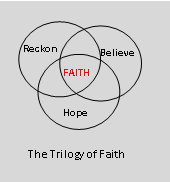
Thus faith is not something passive. Oftentimes faith is assumed to be a belief in God, or in some laws and ritualistic practices of some organized belief system. This is certainly not the case for true Christian faith. Christian faith is directed into action. It is living faith. This faith actually operates in and through the realm of the spirit. It lays hold of realities the world cannot perceive, and makes of its past the present, and of the future the next second. Recall how Jesus said to Nicodemus, “Unless one is born again he cannot see the kingdom of God… nor can he…enter into the kingdom of God.” (Jn. 3:3, 5) Faith is of the spirit! It translates the believer into heavenly places unconceivable by natural man. Faith convinces one of his intimate unity with the life and nature of Christ, sharing in His past, abiding in His presence, and anticipating a glorious union with Him in a future resurrection. This faith transforms the inward man, renewing his heart and purging the deeply rooted feelings, attitudes, and prejudices. A new life is shaped by the inflow of life and energy of His Spirit.
The following diagram illustrates this link between faith and time:
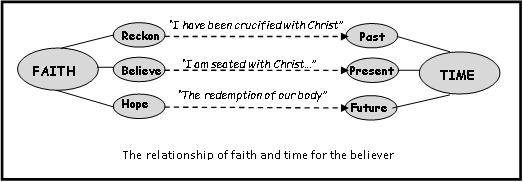
Reckon: The basic meaning in a Greek word dictionary of reckon has to do with consider (also: take into account, credit, come to the bottom line, reason to a logical conclusion). The word ‘reckon’ was a favorite of Paul, using it 27 times in his letters. He used it to declare that God reckons (credits) faith as righteousness. In God’s Book of Life, recorded under righteousness for the believer, faith is credited to the believer’s account, rather than the debit side. (This stands in contrast to crediting wages to someone who has worked to earn them.) (See Rm. 4:4) It is marvelous that the believer in Christ has His righteousness. I know many who reckon a church building as something sacred, and treat it as a holy item. Which is greater though, the church building in the absence of the Body of Christ or the Body of Christ absent of the church building? If answered, “the building,” one answers according to the Old Covenant in which things such as the tabernacle, the altar, candlestick, etc. are considered holy and must be treated as such. If one answers, “The Body, the Church,” he reckons correctly according to the New Covenant reality of the presence of God in His people. The building should be only reckoned simply as a meeting place, and the gathering of saints as the temple sanctuary and the very habitation of God in the Spirit. Reckon: treat it as an absolute fact and react accordingly.
This word reckon is often used to invoke the memory of other spiritual facts credited to the believer. This will be elaborated upon in the following Chapter. For now, consider only the scripture, “I have been crucified with Christ; it is no longer I who live but Christ who lives in me…” (Gal. 2:20) It is: (1) in the past tense therefore part of our history, (2) factual, or a part of our spiritual reality, (3) reckoned by God as already credited to our account, and (4) now to be reckoned by faith in our own hearts… treat it as an absolute fact and react accordingly. This faith is life changing!
Believe. The verb counterpart of the noun faith is believe. Although the word believe can actually be applied to all measures of time, it is used here to focus on the reality of the believer’s present spiritual situation. Believe means “to trust.” It is to recognize that something is true, even though one may not perceive it through his senses. When Jacob’s sons told their father that his beloved son Joseph was still alive and was a ruler in Egypt, “he did not believe them.” (Gn. 45:26) It was factual. It was true, but Jacob did not believe. It took additional convincing before he finally said, “It is enough. Joseph my son is still alive. I will go and see him before I die.” (Gn. 45:28) Physical facts convinced Jacob of his son’s well-being. The believer must now, today, be convinced that the spiritual facts surrounding his own well-being in Christ are true and just. As Jesus spoke to Thomas, “Do not be unbelieving but believing.” (Jn. 20:27) That is, “become believing.”
Sometimes just hearing a spiritual truth is not enough to compel one, or another, of its reality and the need to give all and trust this truth into his life. Not everyone who hears the Gospel for the first time falls to his knees, repents, and receives Christ into his heart. For some it takes more *convincing. After all, even Paul “entered the synagogue and continued speaking out boldly for three months, reasoning and *persuading them about the kingdom of God.” (Acts 19:8) And, quite often it takes more convincing for a believer to give all, surrender to, and fully trust deeper spiritual truths. For example, one being, “raised up together and made to sit together in the heavenly places in Christ Jesus.” (Eph. 2:6) This is: (1) in the present tense, happening now, this very moment, (2) factual, or a part of our spiritual reality, (3) an expression of God’s mercy and love, and (4) now to be trusted or believed in faith as a present reality. It is also a life changer.
Hope. The third action element of faith is hope. Hope has an eye to the future. It is “the substance of things hoped for…” (Heb. 11:1) Of utmost importance, it must be understood that hope has nothing to do with wishing, coveting, longing, dreaming, or yearning for something yet unobtainable. If one is convinced in faith of a promise to come, he then fully expects and anticipates the reality of that promise. With an exhortation towards maturity, it is written in Hebrews,
“And we desire that each one of you show the same diligence to the full assurance of hope until the end, that you do not become sluggish, but through faith and patience inherit the promises.” (Heb. 6:11-12)
And further,
“Thus God, determining to show more abundantly to the heirs of promise the immutability of His counsel (or, unchangeableness of His counsel will), confirmed it by an oath, that by two immutable things, in which it is impossible for God to lie, we might have strong consolation, who have fled for refuge to lay hold of the hope set before us.” (Heb. 6:17-18)
There is a glory set before the believer yet to come. When looked into, it literally is almost beyond imagination…yet it is true and is reserved as an inheritance surely to come.
And regarding the redemption of our body, Paul writes,
“For we were saved in this hope; but hope that is seen is not hope; for why does one still hope for what he sees. But if we hope for what we do not see, then we eagerly wait for it with perseverance.” (Rm. 8:24-26)
Faith is thus the assurance of things hoped for! It is the anticipation of things to come, the persuasion of the coming fulfillment of promises.
Foundation
A foundation for the intricate interweaving of the trilogies of time and faith has now been laid. It is something to build upon. In the following chapter on the Trilogies of Time and Faith, we’ll look in greater depth of how the faith elements of reckoning, believing, and hoping are closely linked to, and interwoven with, time elements of past, present, and future. This is all with an aim to give understanding to the spiritual reality of our place in Christ, of the ultimate calling upon our lives, and of our quest in becoming unto full stature, in Christ.

